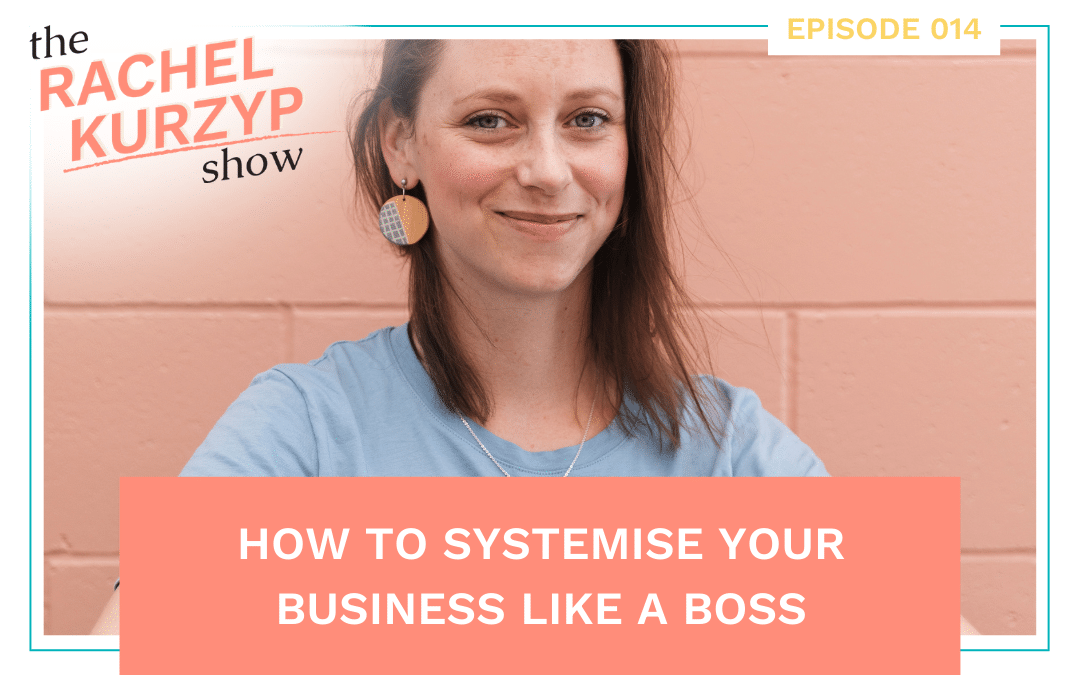Welcome to The Rachel Kurzyp Show
You’re listening to episode 14.
Today I want to talk about the importance of having systems and processes in your business.
About 60% of the small business owners I have engaged with to help me with various things in my business from legal to design to admin over the last eight years didn’t have a system or process.
How do I know this?
Here are a few examples.
- Invoices weren’t sent to me until I followed them up. This means they weren’t getting paid for the work they were doing.
- They didn’t complete the work on the agreed deadline and then I was sent an email saying they overbooked themselves which means they aren’t keeping track of their time.
- I was asked how I wanted to work and needed to host all the materials on my own platforms like Dropbox or Google Drive or book meetings through my apps like Calendly and Zoom. This tells me that they don’t have a clear process and haven’t invested in their systems.
- I completed their 3-page new client form and never got a reply or didn’t hear from them for 6 months. This tells me they didn’t have a way to nurture their leads.
Systems and processes can make or break your business.
They contribute to your profit, customer experience, reputation, visibility and can protect you from nightmare clients, copycats and general overwhelm.
Business owners love investing in front-end things like branding, design, and copy but I often get resistance when I say they need to invest time, creativity, and money into their backend systems.
And I believe is due to two reasons.
- They feel so overwhelmed and out of control that they don’t want to stop because they’re afraid their business is going to fall around them and this could happen, it’s a valid fear
- They believe they need to invest in a team because their problem is that they have too much work to do. When in actual fact, hiring another person wouldn’t address any of the underlining issues, particularly the ones I just mentioned.
If this is resonating with you, you’re in luck because I’m going to share how you can do a very simple process and systems audit of the main areas in your business.
My hope by sharing this, it will give you an insight into where you can focus your time and money in your business and plug any holes you may currently have.
1. Area #1 Money
So many business owners hate following up their unpaid invoices. And I get it, so you need to take the emotion out of it by making asking for payment part of your process. How do you currently ask for payment? Is it easy for a client to pay you? Can you send automated follow ups as a part of your current customer management systems or payment applications? Dubado and Teachable can do the following up for you. Either way, create a standard message that you can send to your clients when needed and look into adding payment options like credit card.
2. Area #2 Time management
I over booked myself is one of the biggest causes of missed and moving deadlines. Look we’ve all been there and most of your clients will understand the first time but if this happens on the regular you may risk losing the client. If juggling projects and your time is a struggle, use an app like Asana to map out the project action items as the first step in your onboarding process so you can see what your daily work load looks like for the next few weeks. And if client calls and scheduling meetings is eating into your day, use an online app like Calendaly which will help reduce the backwards and forwards email conversations. It’s time (see what I did there?) to get your to-do list out of your head and into a system.
3. Area #3 Clients
How do you want to work with your clients? What do you need from them to do your job? What work do you need to collaborate on? Start with these three questions. Once you have your answers, then look for a project management solution. Often business owners buy a solution and then try and make it work with their problem. That’s why so many of us have invested in apps that claim to make our life better BUT it didn’t work for us or our clients. Once you’re happy with your client systems, upgrade to the paid versions if you need to. Often the paid options will allow you to integrate different solutions together e.g. Zoom and Drobox. You want to make your customer experience seamless and be more efficient so that you can build a profitable business.
4. Area #4 Marketing
The biggest gaps I see in small businesses is their lead generation. Often we get busy and don’t have time to qualify and take on new clients. This is a great position to be in! However, this doesn’t mean you should ignore new leads. So I want you to see where most of your leads are coming from say via a contact form on your website OR via DMs on Instagram. And then I want you to capture these leads for future marketing efforts AND create an automated message that informs your potential client about what the next steps are and thanks them for getting in touch. Auto response emails on Gmail is great for this and you can send automated messages on Instagram too. Don’t forget to add a personal touch so your potential new client or customer feels seen and heard by you.
Now you have everything you need to start auditing the main areas of your business and make small changes that can have a big impact.
Was this podcast episode helpful? Send me a DM On Instagram and let me know.
Thanks so much for tuning into today’s episode.
If you’ve found what I’ve shared valuable please leave a review and hit the subscribe button so you don’t miss when a new episode drops every Wednesday.





